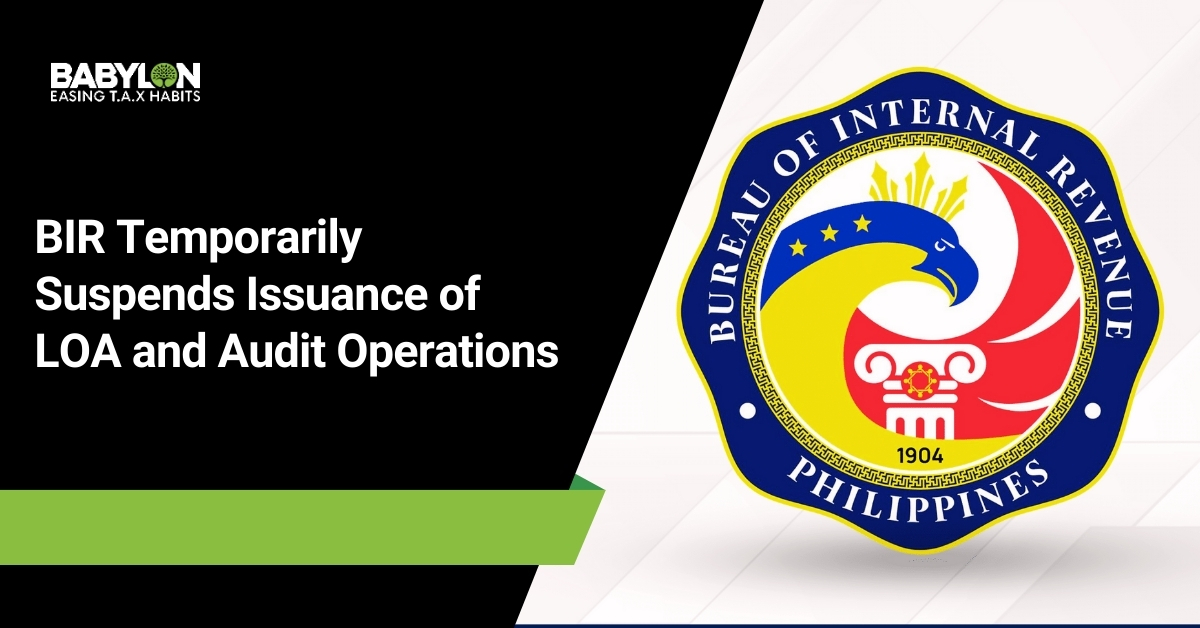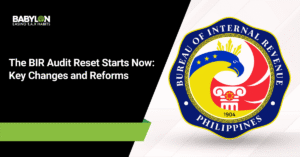Recently, the Bureau of Internal Revenue (BIR), along with the Department of Finance (DOF), ordered a temporary suspension regarding the issuance of Letters of Authority and the conduct of audit operations of the BIR, which is a move that immediately caught the attention of businesses, accountants, and tax professionals.
The directive was announced jointly by the newly appointed Finance Secretary, Frederick Go, and the new BIR Commissioner, Charlito Mendoza, stating that there is a need to strengthen discipline and integrity within BIR operations, address taxpayers’ concerns, and review audit operations.
From the taxpayers’ perspective, this suspension may seem like a break from the BIR, but it also signals a major procedural reform within the country’s primary tax enforcement agency.
First, What is a Letter of Authority (LOA)?
Before going deep into the suspension, it’s essential to understand what the LOA represents.
A Letter of Authority is the official document that allows specific Revenue Officers to conduct an audit of a taxpayer for a particular taxable period. Without a valid LOA, any audit conducted by the BIR is considered void, and the taxpayer subject to the audit is not required to present their records.
In simpler terms, it means that no LOA, no audit. Hence, that’s why this recent suspension is such a significant development on the part of the enforcement of tax laws and administration.
Why Did the BIR Suspend LOAs and Audit Activities?
The BIR and DOF did not implement a random pause, but instead, a policy reform. Each significant reason below implies that taxpayers and practitioners should acknowledge.
- To Fix Internal Compliance Issues and Procedural Errors – the recent suspension aims to address concerns from the general public about procedural lapses in the BIR audit process. Over the years, the BIR has faced numerous criticisms and court losses due to defective LOAs.
- Stop Unauthorized and Unamended Officer Reassignments – another significant issue is the practice of reassigning Revenue Officers named in a LOA without issuing a new LOA or an amendment to the taxpayer audited. Courts have repeatedly invalidated assessments made by Revenue Officers who were not specifically designated and authorized in the original document.
- Enforce Audit Timelines – Under BIR regulations, a tax audit must be conducted within 120 days. However, many audits have been extended far beyond the prescribed period due to delays and improper controls.
- Supporting Digitalization – The suspension also aligns with the BIR’s ongoing digitalization efforts, allowing the agency to recalibrate audit systems, integrate new technologies, and strengthen data-driven processes — leading to much efficient revenue collection.
- Strengthen Taxpayers’ Rights – the suspension of LOA and audit operations reflects the acknowledgement of taxpayers’ voices, which primarily concern their rights. Invalid LOAs, reassignments without authority, and audit backlogs have led to numerous legal issues, with most rulings favoring taxpayers.
Therefore, this pause depicts the BIR’s and DOF’s intention to regain the public’s trust that all assessment processes strictly follow the law and other regulatory requirements, thereby protecting both the agency and taxpayers from such disputes.
Cases Exempted From the Suspension
Despite the suspension on LOA issuance and field audits, the BIR clarified that specific investigations will continue. These include criminal tax cases, one-time transactions (ONETT), audits nearing prescription (within 6 months), and refund or tax credit claims that require audit verification. These cases shall proceed because they involve either legal deadlines or situations where government action cannot be delayed.
What This Means for Businesses and Taxpayers Right Now
The suspension may feel like a temporary sigh of relief, but it also creates essential responsibilities.
- Checking the validity of any LOA served before the suspension – it is now the opportunity for the taxpayers to carefully verify the authorized Revenue Officers named, the exact taxable period covered, and the types of tax subject to audit. Any issues or defects can render the LOA invalid and the right to decline audit until an appropriate LOA is issued.
- More vigorous enforcement once the suspension is lifted – once the internal issues are resolved, audit operations will likely continue with stricter documentation requirements, faster timeline, more accurate designation of Revenue Officers, and tighter monitoring from the National Office. This is the perfect time to fix books of accounts, reconcile discrepancies, and prepare for compliance.
- Be prepared for subpoenas in place of LOAs – if your case or situation is already under scrutiny, the BIR may issue a Subpoena duces tecum or a Subpoena ad testificandum, which requires one to appear or submit documents, as non-compliance can lead to legal consequences.
The Bottom Line
The BIR’s temporary suspension of LOA issuance and audit operations is not merely administrative — it shows a deeper push toward procedural integrity, legal compliance, and taxpayer rights protection. For now, taxpayers should use this period wisely: prepare, review, and strengthen their financial documentation, because once the BIR resumes full audit operations, the landscape will be stricter and more systematic than before.
During times like this, staying informed is crucial, and this is where Babylon2k, enhanced by BETH AI, becomes essential. Should you need guidance in validating LOAs, preparing for future audits, or understanding how this suspension affects your business, you may contact Babylon2k for personalized support or ask BETH AI for help in navigating the technicalities.






